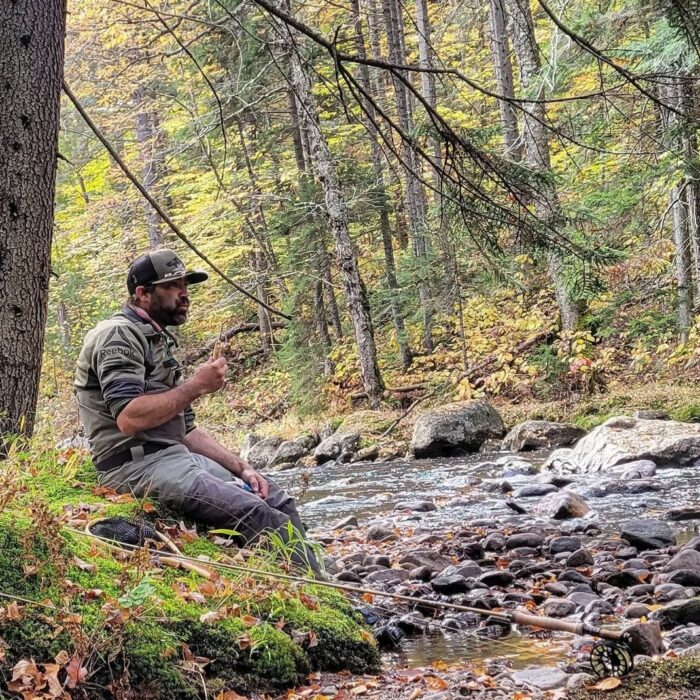Mark was kind enough to allow me to share one of the stories from the new book. So, I give you “Ground Hog Day.”
Groundhog Day
In February of 2020, I fished in the Finger Lakes region with Steve Firlit. He’d asked me if I wanted to do some winter trout fishing, and since I like fishing for trout and don’t stop just because it’s winter, I said yes. Now winter fly fishing is nothing like summer fly fishing, and that goes without saying. It takes a certain amount more dedication than fair weather fly fishing simply because the odds of frozen toes increase as the odds of catching a trout decrease. But that’s never stopped me.
I sat at a red light just outside of town a couple hours before the sun would show itself, and I remember to this day the feeling of loneliness at that moment. It was dark. The headlights exposed cold blacktop in front of me, snow at its edges, both of them just fading off into the dark. Into nothing. Looking in the rear-view mirror, my brake lights illuminated everything, and the steam from my exhaust mixing with the cold winter night air billowed and rolled red. Behind me in the darkness was my town and my empty, dark house with my couch and a blanket kicked to one end. A pillow with the impression from where my head had been all night laid on the opposite end against the arm.
Bob Seger’s Turn the Page was on the radio, and like all good songs are supposed to do, it was making me feel and think. It was a lonely song. The pavement ended out ahead of me where the headlights no longer reached. Just empty nothing, blackness. It’s a lonely song, ironically written about life on the road, playing in front of thousands of people each night. He’s playing for all these fans, all these eyes are on him, yet he’s singing a song about how lonely it is. The rock star life isn’t all it’s cracked up to be it seems.
It set my mind in motion, dissecting the past few years of my own life. I had two hours to drive to meet Steve in Steuben County, so what better way to get through it than to try and figure out what my problems were and what I’d never be able to do to solve them, right? Over the next two hours I figured out exactly what my problem was, something I’d known for a long time. I just wasn’t happy. No shit. But I figured it out with way more detail than I had in the past—enough to maybe make the knowledge useful to me if I were smart enough to use it.
What I realized was the only thing that made me happy anymore—and happy was a calm, cool, and collected mind, by the way—was to be outdoors and surrounded by nature. Specifically, fly fishing. It was the only thing that put my head in the right condition. Fly fishing was what drove me to find the beautiful places I was happy in, but not the end all be all. I didn’t necessarily need to be in a river casting, but the sights I found on my way to the rivers, while on the rivers, and on my way back out from the rivers, were where I was truly happy. And honestly the only place I was truly happy. The irony of my predicament would be that while fly fishing and the wild places I went to were what made me happy, they were also what caused me to be miserable, because I was constantly in a state of needing to be out there and I couldn’t be, so when I wasn’t, I was unhappy and quite often miserable about it.
It seemed in poor taste to me to moan and complain about it when I had a decent paying job, a house, and a good car. Poor taste because I knew there were millions of people in the world who didn’t have those things and it was all they wanted. But my job….that’s all it was, just a job. It didn’t light any fires inside me. I went in, fixed the same machines day after day, broken down mostly the same way day after day, just a rat in a maze getting a piece of cheese at the end each time. Over and over and over. It provided me with my child support, mortgage, and car payments, but nothing any more satisfying than that.
My house? It was a house, but that’s all it was. It wasn’t a home. Home is where the heart is, after all, and there was no heart there. It was a place to sleep and keep my stuff. And my car? Well, it was the only thing I really felt I needed, and that was only because it got me to work to pay for it all. But it did get me to the woods and the rivers; I’d give it that.
We weren’t born to pay bills and die. And on the back of that one, I’d add that no amount of money ever bought a second of time. And we weren’t meant to be cooped up in buildings all day long surrounded by machines and walls and man-made noise and artificial light and recirculated air. We just weren’t. This was where my discontent came from. The older I got, the more it ate away at me. I felt like I had large chunks missing from it eating away at me. Big dog-sized bites.
I thought about all of this on the two-hour drive to meet Steve, and then it was all gone when we stepped in the river. Poof—just like that.
We spent an entire day wading a river that was only about thirty-five degrees, fished streamers for big browns that may or may not have been there, and we struck out. But getting skunked hardly ever matters to me because the fly rod is just what gets me out there. It’s like a walking stick in that it helps you to go places and see magnificent things that you wouldn’t see otherwise—things those who don’t wander rivers in the dead of winter don’t even know exist.
There was a Sycamore tree in the river, probably deposited there after the bank it was on had been eroded away out from under it, and its root ball had managed to catch and collect a huge mound of debris from the current. Hanging below and from all the debris was one of those sights that winter anglers get to see and hardly anyone else—besides beavers and otters and birds and the squirrels and ducks.
At first I thought the whole thing looked like a big chandelier hung just above the water’s surface, then I thought that maybe it looked like some mystical fantasy like crystal wind chimes. Later on, I agreed when showing a photo of it to someone else that it looked like a colony of ice bats sleeping as bats do, hanging from a cave ceiling. There were no fish that day and still I came away with stories and memories, as if I hadn’t gone because of fish at all. Which begs the question: Am I ever really?
The next day we drove farther upstream into the headwaters where the river was nothing more than a small stream passing through farmland, swamps, and forest. I rigged up my short 6’6” 3wt. It seemed odd at first to think about it. It was my go-to rod for chasing small wild brook trout in the Adirondacks, and here I was in flat lands with a small streamer, hoping to find large browns in this tiny stream. The first half of the day felt like the previous day all over again as cast after cast came up empty. It felt like that movie Groundhog Day, where Phil Connors keeps waking up to find he’s reliving the same day over and over again and finally gets out of it by doing it the right way. Then the joke hit me: It actually was Groundhog Day.
Fishing on February 2nd seemed like just as much of a joke as fishing on April 1st at that moment. But I’ve got a good sense of humor, so I just kept casting. I expected to catch nothing just like the day before and was perfectly fine with the thought. Which, of course, was when the universe decided to throw me a fastball and stick a trout on my streamer.
A trout caught on a fly rod is always a special moment. But a trout caught in the dead of winter from a small stream during a heavy snowfall can be something different altogether. It wasn’t big—eleven or twelve inches maybe—and the size didn’t matter in the least. When you worked hard for a fish all day on the previous day and came up empty, and then had reserved yourself to the idea that today would be more of the same, suddenly that fish, that moment, becomes the most genuine high-five with a friend that’s ever happened.
Later in the afternoon, not long before we’d call it a day, Steve stumbled across antlers poking out of the fresh snow and ended up taking home one of the greatest fishing trophies one can find outside of a beautiful catch. It was quite the site to follow behind him as we carefully made our way quietly through the woods. He carried the skull with the massive eight-point rack in one hand and his fly rod in the other, and he’d set the skull down in the fresh snow next to him where he’d kneel by the stream to make a couple stealthy casts. It was like living on the cover of some old outdoors magazine.
And there again I knew. It’s not about the fish or the fishing. The fishing is out there and so we go out there. Throughout any given fishing trip, a fish is only a single moment in a string of infinite moments over your lifetime. And those moments are what get me through the days that I can’t be out there, and at the same time what makes those days so much harder to bare, knowing where I could be.
I knew how lucky I really was when I considered all things. What I’d seen in the world, where I’d been, the people I’d met, the places I’d been. It was luck to a great deal that had put me here. I could’ve been born in New York City or Chicago, or even China. Or I could’ve been introduced to golf instead of fishing. I cringed, imagining my grandfather golfing instead of putting a worm under a bobber.”
If you’d like your own copy, they are all available on the JP Ross Website. Click the links below to check them out.

